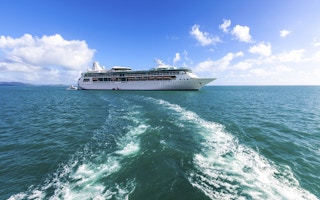Getting ships to generate smaller bubbles as they sail across the oceans could counteract the impact of climate change, a study suggests.
Scientists from University of Leeds, UK, say this would create a brighter wake behind a vessel and reflect more sunlight back into space.
However, it could also increase rainfall in some areas.
The findings were presented at the American Geophysical Union Fall Meeting in San Francisco.
This is the latest idea from the hotly debated field of geoengineering - manmade global fixes to climate change.
Suggestions for reducing the amount of solar radiation absorbed by the Earth range from installing giant mirrors in space to injecting salt into clouds to make them more reflective.
But Leeds’ Prof Piers Forster said the bubbles idea was a more plausible scheme.
He told BBC News: “A lot of these technologies are completely hypothetical.
“The one advantage about this technology - of trying to generate these tiny ‘micro-bubbles’ - is that the technology does already exist.”
Double benefit
As ships sail across the waves, the white froth they create in their wake stands out from the dark ocean waters.
But the team behind this study said that if the bubbles in the froth were smaller in size, the watery trail would be even brighter.
More importantly, it would also stick around for much longer: the bubbles could last for up to 24 hours, compared with an average lifetime of a few minutes for ordinary bubbles.
This would have the effect of reflecting and refracting sunlight off the surface of the ocean, said Prof Forster.
The team found that making bubbles 10 to 100 times smaller than their current size - to about 1 micron (one millionth of a metre) - had the greatest impact. And that this could be done by fitting aerosol technology to the backs of ships.
Julia Crook, also from Leeds, explained: “The technology required for other forms of solar radiation management is a long way off being ready, whereas micro-bubble generators already exist.
“The Japanese are already experimenting with micro-bubbles under ships’ hulls to make them more streamlined and more fuel-efficient.
“This could have a double benefit.”
She added: “This form of solar radiation management has the advantage over stratospheric aerosol injection, in that one could move ships with bubble generators to different parts of the ocean, providing more control on the regional temperature and precipitation changes induced.”
Temporary fix
The team used a computer model to calculate what would happen if 32,000 large ships - the current estimate of large vessels on the high seas - produced tinier bubbles.
“If we were to successfully put these generators on to these ships, and the ships just went about their normal business, we did find there was potential to reduce the surface temperature by about 0.5C,” Prof Forster said.
However, while this would somewhat counteract the effect of climate change, the team found it would also increase precipitation in some areas.
And there are some concerns about unforeseen consequences on ocean ecosystems, although the team thinks that the scheme probably would not affect ocean productivity - how carbon is moved around the ocean.
However, Prof Forster said that it was unlikely that this geoengineering fix - or any others - would be implemented anytime soon.
“I think with all these technologies, we would be looking at decades to implement them,” he told BBC News.
“They aren’t a very rapid solution that perhaps people think they ought to be.
“Also, it’s important to say that these will only ever be a temporary fix - you also need to cut your carbon emissions to prevent long-term climate change.”








